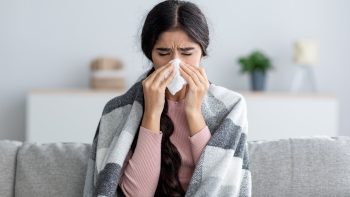
DISCLAIMER: This article is provided for educational and informational purposes only and does not constitute providing medical advice. The information provided should not be used for diagnosing or treating a health problem or disease, and those seeking personal medical advice should consult with a licensed physician.
Cold and flu season hits at the worst possible time—right when holiday plans, family gatherings, and festive events are in full swing. It’s like your immune system didn’t get the memo that you need to be at your best to stomach your aunt’s infamous bratwurst casserole.
As if the shorter days, holiday chaos, and end-of-year stress weren’t enough, now you’ve got a sore throat to top it all off. While getting sick during this season is miserable, knowing the basics about colds and the flu can help you recover faster—and hopefully avoid spreading it to everyone else.
Cold vs. Flu: What’s the Difference?
The common cold and influenza are both viral infections, but they’re not the same. Knowing which one you’re dealing with can help you manage symptoms and know when to seek medical attention. Let’s clarify the lineup of seasonal offenders.
The Common Cold
A viral infection with over 200 possible culprits (thanks, rhinoviruses), colds are the less dramatic sibling in the illness family. Symptoms are usually mild and manageable, though they can feel like they last forever.
Cold symptoms:
- Runny or stuffy nose
- Sneezing
- Sore throat
- Mild cough
- Fatigue
- Occasional low-grade fever
The Flu (Influenza)
Influenza is aggressive. It hits harder and faster, making even the strongest among us feel like we’ve been hit by a truck. If you get an influenza virus (A, B, or C), you’ll feel sick for 1–2 weeks, though fatigue can stick around longer.
Flu symptoms:
- High fever (often 101°F or higher)
- Severe body aches
- Chills and sweats
- Persistent cough
- Extreme fatigue
- Headache
- Sometimes vomiting or diarrhea (more common in kids)
While colds can be annoying, the flu is much more serious, especially for young children, the elderly, or anyone with a weakened immune system.
Cold and Flu Remedies That Actually Help
There’s no magic cure for the cold or flu, but these tried-and-true remedies can make the ride a little smoother:
- Rest, Rest, Rest. Your body needs downtime to fight off the virus. Skip the holiday parties, stay in your pajamas, and embrace the nap life.
- Stay Hydrated. Water, herbal tea, and brothy soups are your best friends. Avoid caffeine and alcohol, which can dehydrate you further.
- Ease a Stuffy Nose. Use saline sprays, humidifiers, or steam inhalation to loosen mucus.
- Soothe a Sore Throat. Gargle with warm salt water, sip on honey and lemon tea, or suck on lozenges to ease the pain.
- Over-the-Counter Helpers. Decongestants, antihistamines, and pain relievers like ibuprofen or acetaminophen can alleviate symptoms. Just read labels carefully, and don’t mix medications without checking.
- Grandma’s Favorites. Chicken soup, ginger tea, and cozy blankets. The science may be fuzzy, but the comfort is real.
When to See a Doctor
Most colds and mild cases of the flu can be managed at home, but certain red flags mean it’s time to call in the pros:
- Symptoms last more than 10 days or worsen after improving.
- High fever (over 103°F) or a fever that persists for more than three days.
- Difficulty breathing or chest pain.
- Severe sore throat with white spots (could be strep).
- Persistent vomiting or dehydration.
- Confusion or extreme fatigue.
For kids, fast breathing, refusal to eat or drink, bluish skin, or extreme irritability warrant immediate attention.
Flu antivirals like Tamiflu can be helpful, but only if started within 48 hours of symptom onset.
Keeping Others Well When You’re Sick
No one wants to be the holiday party patient zero. Here’s how to keep your germs to yourself:
- Mask Up. If you have to leave the house, wear a mask to reduce the risk of spreading the virus.
- Wash Your Hands (Like, a Lot). Soap and water for at least 20 seconds—or hand sanitizer if you’re in a pinch.
- Cover Coughs and Sneezes. Use a tissue or your elbow, not your hands.
- Quarantine Yourself. Stay home from work, school, and gatherings until you’ve been fever-free (without meds) for 24 hours.
- Disinfect Everything. Wipe down frequently touched surfaces like doorknobs, remotes, and phones.
How Does a Cold and Flu Spread?
Understanding how these illnesses spread can help you stay proactive about prevention.
- Direct Contact: Shaking hands, hugging, or touching contaminated surfaces (like doorknobs or your phone) and then touching your face can introduce the virus to your system.
- Airborne Transmission: When an infected person coughs, sneezes, or even talks, tiny droplets containing the virus can linger in the air or settle on surfaces.
- Shared Items: Sharing utensils, cups, or towels with someone who’s sick can spread germs quickly.
Cold and flu viruses are resilient, surviving on surfaces for hours. That’s why frequent handwashing and disinfecting high-touch areas are key to keeping germs at bay.
4 Prevention Tips for Next Time
An ounce of prevention is worth a pound of cure, especially during cold and flu season.
1. Flu Shot: It’s your best defense against severe flu.
2. Boost Immunity: Eat nutritious foods, get regular sleep, and manage stress.
3. Practice Hygiene: Wash hands, avoid touching your face, and stay away from sick people.
4. Stock Essentials: Have tissues, medicine, and easy-to-make meals ready before you’re sick.
Immune-Boosting Tips
While there’s no foolproof way to avoid getting sick, keeping your immune system strong can help reduce your chances.
- Eat Your Vitamins: Focus on fruits and vegetables rich in Vitamin C (oranges, bell peppers) and zinc (nuts, seeds).
- Stay Active: Moderate exercise like walking or yoga can strengthen your immune response.
- Sleep Matters: Poor sleep weakens immunity. Aim for 7–9 hours of quality rest each night.
- Stay Hydrated: Drinking plenty of water helps your body flush out toxins and keeps your immune cells functioning properly.
While supplements like elderberry or echinacea are popular, their effectiveness is debated. Always consult your doctor before trying new remedies, especially if you’re on medication.
Getting sick around the holidays is the ultimate bad timing, but it happens to the best of us. Focus on taking care of yourself, keeping germs to yourself, and being kind to your body. No one will fault you for skipping the potluck or rescheduling plans if it means everyone else stays healthy. After all, the best gift you can give your loved ones is not giving them your germs.
By Admin –



